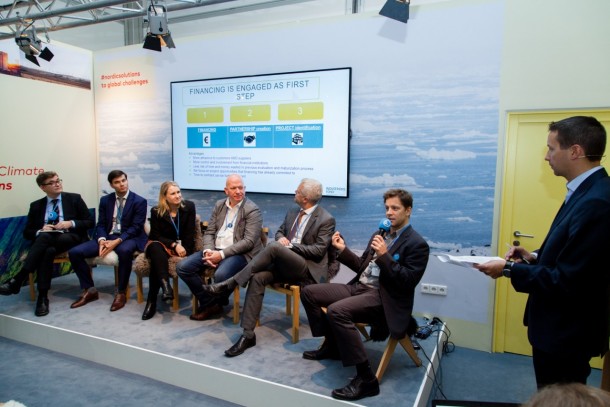17.11.2017 | News

At the UN Climate Summit on 14 November, NEFCO arranged a discussion on how to mobilise green investments for smart solutions. A broad variety of innovative climate solutions and alternative ways of project financing were presented.
The event was opened by NEFCO’s Managing Director Magnus Rystedt, who gave an overview of our activities and highlighted that financing, regulation, co-operation and innovation are all preconditions for a successful implementation of green projects.
Karoliina Auvinen, Project Director at Aalto University and Stakeholder Relations Director for the Smart energy transition research project in Finland, called for stronger economic drivers for new technologies. As green technologies often have been implemented in small units, it has so far been challenging to attract financing for these solutions.
The newly established BaltCap Infrastructure Fund, a private equity fund for the Baltic states investing in energy efficiency and renewable energy projects, where NEFCO is also an investor, has recently received commitments for more than EUR 67 million, but Sarunas Stepukonis commented that one of the main challenges is to find bankable projects. Stepukonis also highlighted that it is very important to increase the implementation capacity of municipalities as well as to find scalable projects.
The Swedish company Ignitia AB, which has developed an innovative way to deliver more precise weather forecasts to farmers in West Africa by simple text messages, is a fascinating example of how to empower the local farmers to adapt to the ongoing climate change. Shawn Brown, Vice President at Ignitia, explained that the company can predict the weather with an accuracy of over 80% compared with other international forecasts, which have an accuracy of about 40%.
Differ AS, a Norwegian investor and provider of renewable energy services, has provided many people who do not have access to the grid, in Asia and Africa, with solar energy and clean cookstoves. Both Differ and Ignitia have received grant funding from Nopef, a trust fund managed by NEFCO, to establish local business operations in their project countries. Tom Erichsen, CEO at Differ, pointed out that it is crucial for small companies to get financial support in the start-up phase.
The Danish cleantech cluster CLEAN supports innovative and sustainable projects and is a facilitator that takes its member companies closer to the market. Peter Keller-Larsen, Director of International Business Development, presented its new way of helping SMEs to implement projects abroad. The first step is to identify the financing, the next is to create a partnership and the last is to identify the projects. This new model for project implementation has already showed some good results.
The conclusions from the discussion were that international financial institutions, like NEFCO, are valuable and can have a catalysing effect for the companies they are investing in and also enable up-scaling of existing technologies. Furthermore, they can link different interest groups, which is crucial for implementing green projects.
The discussion was moderated by Janne Peljo, Leading Specialist at Sitra, and was one of the programmes included in the Nordic Finance Day, which was co-arranged by NEFCO, the Nordic Investment Bank (NIB) and the Nordic Development Fund (NDF) and arranged at the Nordic Pavilion. The Nordic Council of Ministers is the main organiser of the Pavilion at the UN Climate Summit (COP23) in Bonn together with Nordic organisations and institutions.